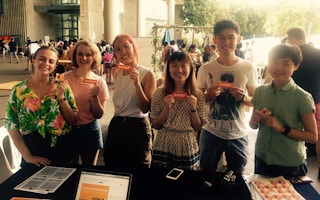Singapore is not famed as a land of environmental activism. But even so, the conservative city-state is said to be more environmentally woke than many of its Southeast Asian neighbours.
To continue reading, subscribe to Eco‑Business.
There's something for everyone. We offer a range of subscription plans.
- Access our stories and receive our Insights Weekly newsletter with the free EB Member plan.
- Unlock unlimited access to our content and archive with EB Circle.
- Publish your content with EB Premium.
In a recent survey by World Wide Fund for Nature (WWF), which bases its global Earth Hour movement in Singapore, two-thirds of residents said they supported a ban or tax on plastic, a sentiment that was backed by a petition calling on a plastic bag charge that drew 21,000 signatures.
In another study, 75 per cent of residents said they wanted legislation to crack down on shark fin in Singapore, which is the world’s second largest trader in the controversial dish. And in 2017, two years after the worst haze Southeast Asia has ever seen, petitions from teenagers pressured local retailers to switch to sustainable palm oil.
Meanwhile, plastic reduction and shark fin has been raised in Parliament in the last four months by environmentalist turned politician Louis Ng, albeit with limited success.
If Singapore’s largest sustainable living festival, EarthFest, is anything to go by, the city-state’s environmental consciousness is growing.
“
We keep preaching to the converted, and I don’t see the pie growing.
Mayur Singh, founder, The Green Collective Singapore
The festival, now in its fourth year, drew 8,000 people to Marina Barrage last weekend. From the first event in 2015 to this year, EarthFest has more than doubled, from 60 to 130 stalls offering a range of sustainability-related fare, from vegan burgers and compostable toothbrushes to talks on zero waste living and environmental activism.
But beyond events like EarthFest, where some say the sustainability community tends to talk to itself, how real is Singapore’s green movement?
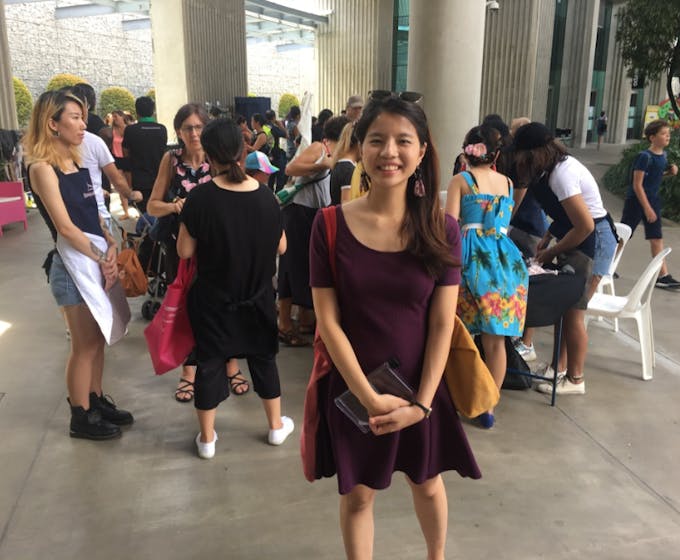
Melissa Chong, who has campaigned against shark fin in Singapore: “If you only hang out with fellow greenies you will exist in an echo champer.” Image: Eco-Business
“There’s a small pool of us who believe in the cause,” says Melissa Chong, who worked on WildAid’s shark fin campaign and is an advisor to environmentalist-turned-politician Louis Ng.
“If you only hang out with fellow greenies you exist in an echo chamber, and you will think the green movement is mainstream,” she says. “But it’s not—not yet.”
Mayur Singh is founder of The Green Collective, a group of green living stores that launched last year. “I know the people who are buying from us. I’ve seen them before. We keep preaching to the converted, and I don’t see the pie growing,” he says.
Others see change. Madhu Rao, senior regional advisor for Wildlife Conservation Society, points to the angry opposition to a fake ivory store created as part of an awareness campaign by WWF six months ago as evidence of an upswell in public consciousness around sustainability issues and Singapore’s role in the illegal wildlife trade.
Eco-Business asked other EarthFest attendees if they think eco consciousness is really taking off in a country that consumes more resources per person than anywhere in Asia.
“
People who come to EarthFest have the brain space to think about bigger things beyond just survival.
Melissa Chong, consultant, Corporate Citizenship
Consumer activism
For some, it seems like environmentalism in Singapore appeals only if it can show a material benefit.
Andrea, a local volunteer for animal welfare group Causes for Animals who did not reveal her full name, says: “I don’t think Singaporeans really care about the environment, if they can’t see the benefit. But if there’s a movement that gives them 10 cents off a bag then they might get involved. There has to be something in it for them.”
As a global city with a strong foreign flavour, she says a steady influx of expats has helped drive the green agenda, pointing to Michael Broadhead, EarthFest’s Canadian founder, and Stephanie Dickson, founder of sustainable lifestyle event Green is the New Black.
For some others, Singaporean environmentalism appears to have a distinctly consumerist flavour and is all about image.
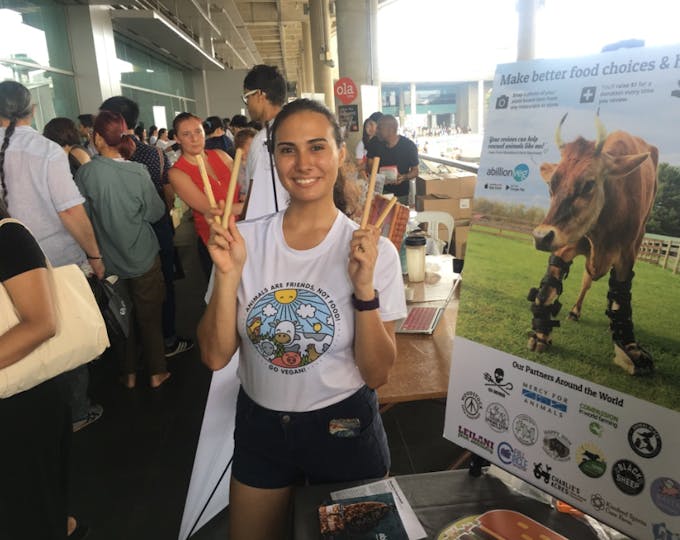
Pro-vegan activist Alaine Johnson: “There’s been a lot of talk about biodegradable straws, but we don’t actually need straws.” Image: Eco-Business
Alaine Johnson is a volunteer for pro-vegan activist group abillionveg. “Everything in Singapore is geared towards retail therapy—wear a bamboo straw as a badge for your commitment to sustainability,” she says.
“It’s all about what you’re carrying with you, and what you’re going out to buy. But we have yet to really think about minimalism and decluttering. There’s been a lot of talk about biodegradable straws, but we don’t actually need straws,” says Johnson, an American who graduated from Yale-NUS with a degree in rural development in Southeast Asia.
Sumita Dhanarajan, associate director for sustainability non-profit Forum for the Future, wondered if green events built around retail really advance Singapore’s green movement. “Is encouraging us to buy more stuff helping or entrenching the problem?” she asks.
Chong says that as long as going green comes with a cost—either convenience or price—it will be difficult for Singapore’s green movement to grow. Environmentalism is out of reach for Singaporeans who are, for instance, unwilling to pay S$8 (US$6) for a vegan hot dog from Beyond Burger, a meatless snack chain that launched in Singapore last August, she says.
“If you want anything to work here, it has to be pragmatic. That kind of thinking penetrates very deeply into our culture. Nobody has time for idealism, lofty ideas and dreams. We’re not that sort of culture,” says Chong.
Token environmentalism?
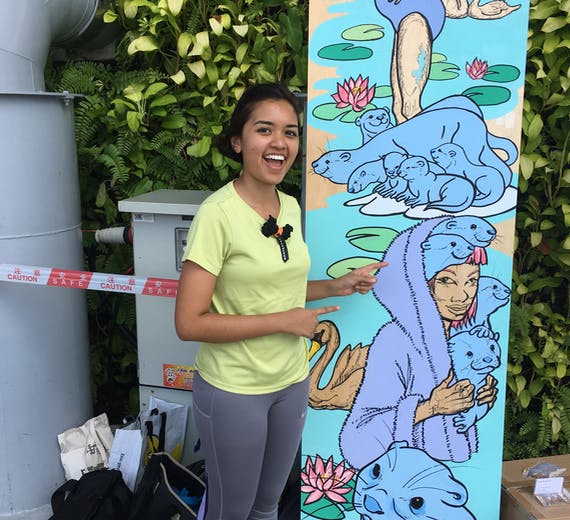
Sumita Thiagarajan of Centre for a Responsible Future: “Many of the programmes run by corporates is token environmentalism.” Image: Eco-Business
Even so, in recent years government and corporates have launched a volley of green initiatives, from the environment ministry’s Year of Climate Action in 2018, which drew 340,000 carbon reduction pledges and 800 climate action-related events, to a consumer-facing recycling campaign from DBS Bank, to tap into Singapore’s waking environmental consciousness.
The problem is, many of these projects can feel like tokenism; one-off stunts rather than part of a solid, sustained movement, says Sumita Thiagarajan, executive director for Centre for a Responsible Future (CRF), a non-profit that helps people and organisations adopt more responsible practices.
Thiagarajan, who previously canvassed schools for wildlife protection group Animals Concerns Research and Education Society (ACRES), recounts the time Coca-Cola visited a school to teach kids about recycling.
“They came in, gave out free drinks, and got the kids to toss bottles into a recycling bin,” she says. “But there was nothing about the need to reduce or re-use.”
Singapore’s real environmentalists?
A walk around EarthFest reveals a distinctive demographic of environmentally-minded people. Greenies tend to be upper-middle class, westernised Chinese Singaporean women who were educated overseas.
“The key thing is they are exposed [to environmental issues] and read beyond the local newspapers,” says former shark fin activist Melissa Chong, who graduated from the London School of Economics.
“People who come to EarthFest have the brain space to think about bigger things beyond just survival,” she says, adding that the sort of people who attend EarthFest probably have a much larger carbon footprint than average Singaporeans.
The older generation of Singaporeans are the country’s “true” environmentalists, she says. “They are very prudent in their spending. They are not materialistic. They reuse a lot of things,” she says, referring to her boyfriend’s mother who weaves coasters out of used milk cartons and reuses water from the washing machine to flush the toilet.
Chong recommends talking to the elderly for a sense of what environmentalism is really about in Singapore. “They make stuff out of used items all the time. What we call upcycling they’ve been doing for generations. The cleaning aunty in the office is more environmentally minded than I could ever want to be.”
Thiagarajan observes that often the people running corporate sustainability projects are not very “deep” into environmental issues and rarely lead an eco lifestyles. “They might work with NGOs, but aren’t really sure about how to see projects through,” she says.
As the government has declared 2019 the Year of Zero Waste, perhaps there will be a clearer focus on the circular economy, says Thiagarajan, who was helping separating trash at EarthFest.
Chong agrees that corporate sustainability projects in Singapore are often tokenistic, but says that these programmes are evidence of a growing market for eco conscious consumers.
“The fact that they use sustainability in their marketing shows that there’s a market for it, and they want to appeal to a certain type of consumer,” she says.
Activism, Singapore-style
Bertand Seah, a political science student at the National University of Singapore (NUS), believes that environmentalism in Singapore is genuine, but is emerging in a very prescribed fashion.
“The government, through initiatives such as Year of Climate Action, is saying climate action can be achieved individualistically, by people reducing waste and cutting their carbon footprint. But there’s not a lot of collective action happening—and that’s something that we are trying to shift.”

Seah is leading the Stand campaign, a movement to push his university to divest from fossil fuels. Short for Students Taking Action for NUS for Divest, it is a parallel effort to a campaign from NUS’s sister university, Yale-NUS College, which launched Singapore’s first ever divestment push in 2017.
“We need to come together as communities and lobby our leaders,” says Seah, adding that his university is a conservative establishment unaccustomed to student activism.
“What differentiates Singapore’s from other divestment movements is that culturally we are completely non-confrontational,” he says. “At Yale-NUS [a partnership between America’s Yale University and NUS] maybe there is more of that culture. But at NUS, not at all.”
Stand’s work involves publishing articles to educate people about the impact of fossil fuels investment and manning booths such as the one at EarthFest. He also hopes to enter negotiations with NUS management. “At this point they’ve been quite unreceptive, but we hope to meet with them.”
“
There’s a change in receptiveness [to environmental messaging] from the mainstream. I can feel the gears changing, but it’s slow.
Hailin Pek, manager, Zero Waste SG
Zero Waste SG is a non-profit that has been campaigning for waste reduction in Singapore for more than a decade. The group’s manager, Hailin Pek, says environmentalism in Singapore has come a long way since Zero Waste SG started out in 2008.
“There’s a change in receptiveness [to environmental messaging] from the mainstream. I can feel the gears changing, but it’s slow,” she says.
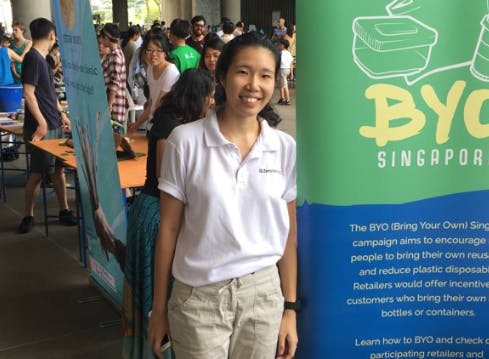
Hailin Pek of Zero Waste SG: “Sustainability is not just a concept you need to get your head around. It’s a journey that can take years.” Image: Eco-Business
Environmental messages are getting through, but since these messages often require a complete change in lifestyle, they can take time to take effect, Pek says, adding that an increased recent interest in environmental issues from the mainstream media has helped raise awareness.
“Sustainability is not just a concept you need to get your head around. It’s a journey that can take years,” she says. “Some people will just stop at refusing straws.”
Pek says she feels Singapore’s environmental movement could move faster with the help of legislation, but suspects the government won’t introduce any new regulations on waste—for instance a tax or ban on plastic bags—before an election or risk upsetting less environmentally-minded voters.
Educating the educators
Equally important is what is being taught in schools. Pek says the education system needs to go beyond teaching the need to conserve the environment with a more practical approach.
“Kids are being taught about the importance of recycling—but not how to. And teachers are not educated on recycling either. Only when teachers are informed and empowered will things really change,” she says.
Thiagarajan of CRF observes that children are often more environmentally aware than their parents. “I’ve seen kids holding on to a bottle and telling their parents to recycle, and their parents saying, ‘Can you just throw it away?’”
“Kids are aware. But most adults are not there yet. They grew up in a time when environmentalism wasn’t the norm,” she says, adding that environmental awareness is higher in international schools than in local schools because there is more of a focus on green issues.
The need for speed
Though there are growing signs of Singapore’s environmental awakening many feel a change of pace is needed to tackle issues such as the country’s growing waste burden and the tendency to overcool buildings as temperatures rise. But how?
“
Being a friend and nudging people along works best.
Sumita Thiagarajan, executive director, Centre for a Responsible Future
What is certain is that there is a fairly narrow path for change. Abillionveg’s Johnson says that Singapore’s “very soft” activism takes the form of quiet conversations between stakeholders behind closed doors. But this can be frustrating. “You get burnt out really fast here if you don’t see wins,” she says.
But Thiagarajan says that tactics that are too vocal could not only get environmentalists into trouble with the law, they would not be socially accepted.
“Using in-your-face tactics would turn people off here,” she says. “You’d be seen as too loud, a troublemaker. When you work with the establishment, you can get a lot more done.”
But how to convince ordinary Singaporeans?
“Being a friend and nudging people along works best,” says Thiagarajan.
“When we first start campaigning we tend to be angry. We think, “why can’t people see it? I see it.’ But we were once ignorant too.”
“Everyone is at a different stage [of understanding green issues]. Some people need more time to see for themselves, an experience they would get by accompanying a friend to EarthFest or trying Beyond Burger.
“It’s nicer to be a friend than to judge people,” she says.

